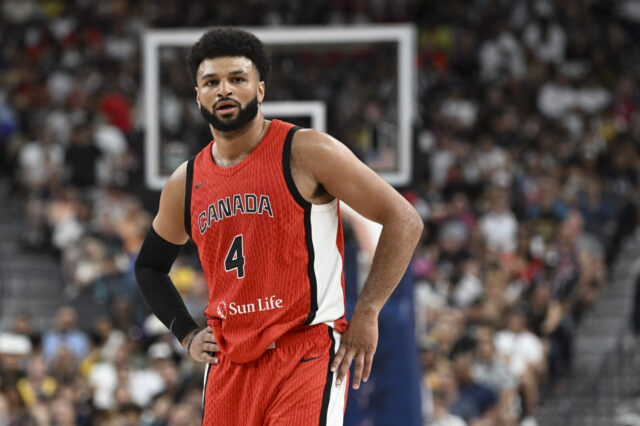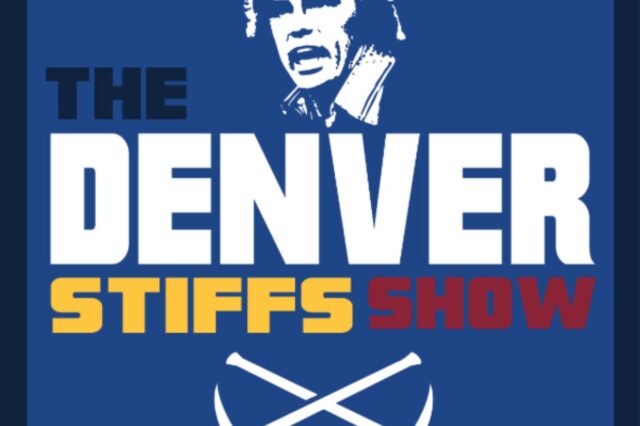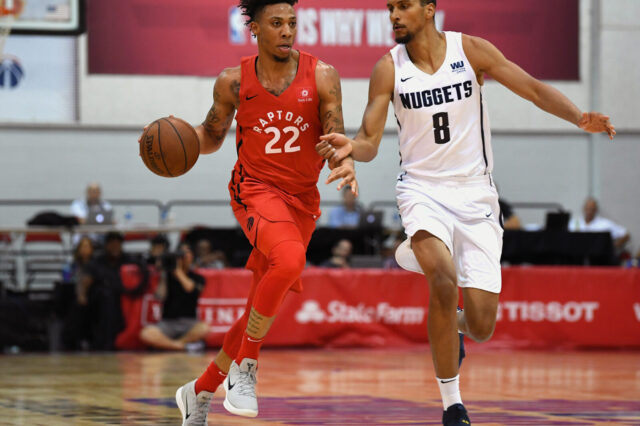To channel my inner Rick Pitino: David Thompson, Alex English and Carmelo Anthony aren’t walking through that (Pepsi Center) door.
For the fourth consecutive NBA season in the Mile High City, our Denver Nuggets this Wednesday will present a roster on opening day devoid of a superstar caliber player. Something that our Nuggets have in common with about two-thirds of today’s NBA teams, mind you.
But our current Nuggets roster possesses three things that most NBA teams – even those with superstars on their rosters – don't have: youth, athleticism and depth.
And it’s time for head coach Brian Shaw to use all three to his advantage.
You can blame injuries all you want for why the Nuggets missed the 2014 NBA Playoffs, their first playoff absence in 11 years (still feels weird writing that!). But Coach Shaw's "system" had as much to do with the Nuggets struggles as did the litany of injuries. Because while it might be true that George Karl's (Shaw's predecessor) "system", or lack thereof, may not have been a recipe for meaningful post-season success, it all but guaranteed regular season success which at the very least translates into playoff appearances. And it's not as simple as playing fast at home to capitalize on Denver's mile-high-above-sea level location, it's a radical change in playing and rotation philosophy. (Even Shaw's Nuggets ranked third in pace among all NBA teams last season, even though it sure felt like Shaw was slowing things down routinely on the court.)
When Karl’s 2012-13 Nuggets delivered a Nuggets NBA franchise record 57 regular season wins, it wasn’t just because they played fast. They played hard, too, because Karl had the hammer of playing time which hung over his roster’s collective heads at all times. If you didn’t play hard for Karl, you sat on the bench – hence why Kosta Koufos started in 81 games and JaVale McGee started in zero, and why Corey Brewer played his tail off in the 24 minutes per game Karl allotted to him.
Entering the 2014-15 campaign, Shaw has already alluded to deploying a similar philosophy, captured last week by our very own Nate Timmons. Said Shaw:
"There's going to be 10 guys at the start of the season, will be two at each position, that'll be in the main rotation."
And …
" … I'm not waiting on anybody."
Combining those two quotes together, it appears as though Shaw is prepared to use the same hammer that Karl did two seasons ago.
But if Shaw and the Nuggets are serious about climbing out of the Western Conference basement and reclaiming their rightful place among the conference's top-eight teams, they will need to take their 10-man rotational philosophy one step further and add a new rotational philosophy atop it: no one plays tired. In fact, perhaps Shaw should consider having Colorado Avalanche head coach Patrick Roy sit in the Nuggets' head coaching chair for a game or two, as the Nuggets will need to rotate their players in-and-out more like a NHL team than a NBA team.
Now back to the "no superstar" thing for a moment and why the Nuggets will need to play a contrarian style of basketball if they're to make the playoffs next April. For as long as I can remember – and with few exceptions – NBA teams rotate their players in and out of games with a somewhat similar pattern. The starters typically play mid-to-high 30-something minutes, two key reserves play mid-to-low 20-something minutes and the rest of the guys fill what I call the Joe Kopicki Minutes (for the modern day fan, call it the Jan Vesely Minutes), and that's how you eat up the 240 available regulation minutes in your average NBA game.
This format works fine when you have guys like LeBron James, Kevin Durant, Stephen Curry, Anthony Davis … even Carmelo Anthony … who can play nearly 40 minutes per game at a high level. Just a like a structured offense / rotation works fine when you have stars who can create their own shot when the structure breaks down. But when you have no stars on your roster, I’ve never quite understood why NBA teams nevertheless play their sub-star players equivalent minutes and within an equivalent structure to what a superstar player might be asked to perform within.
Which brings us back to the Nuggets roster that has no superstar but does have those three other things going for it: youth, athleticism and depth.
YOUTH – With an average age of 26.1, the Nuggets are tied for the 10th youngest team in the NBA.
ATHLETICISM – Kenneth Faried, Ty Lawson, Arron Afflalo, JaVale McGee, Gary Harris, Wilson Chandler, Nate Robinson. Enough said.
DEPTH – The Nuggets are two deep, and in some cases three deep, at each position.
Those three areas, combined with the Nuggets recent injury history, should mean more equitable minutes rather than top-down minutes in Shaw’s rotation. Why play Lawson for 36 minutes, knowing he’ll take eight of them off and knowing he has missed 29 games the last two seasons due to a myriad of little injuries, when Robinson can step in for 15-18 hard minutes and rookie Erick Green will do the same for seven to nine minutes?
Same goes for the small forward / power forward hybrid positions. While we’d all love to see Danilo Gallinari play 35ish minutes per game, wouldn’t the Nuggets be better off playing Gallo in the 25ish minutes range as he comes back from missing 132 regular season games over three previous seasons? Gallo’s available minutes could be divided up by Faried, J.J. Hickson (himself returning from serious injury), Chandler and even Afflalo and possibly the rookie Harris if the Nuggets want to go small. Or go big, and play rookie Jusuf Nurkic for 8-10 hard minutes at power forward alongside a center like Timofey Mozgov or McGee.
Having a standard, set rotation will do Shaw no favors. I hope Shaw is sincere when he says (again, as captured by Nate):
"The guys that are ready to contribute and help us accomplish what we're trying to accomplish, will be the guys out there on the floor. And I don't care if you're the highest paid player on the team, if you have the longest guaranteed contract, or whatever it is."
I love that quote. I love that philosophy. But often it's hard for a player to contribute when he's winded, so here's hoping that Shaw understands that it's not just the number of players in the rotation that counts, but the number of "fresh" minutes that they play – because that's how you run opponents off your home floor.
And it might be the only pathway back to the playoffs for our Denver Nuggets.


